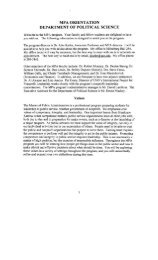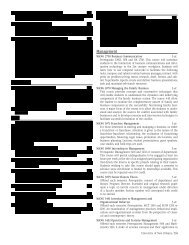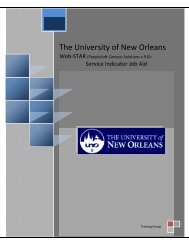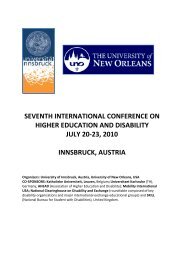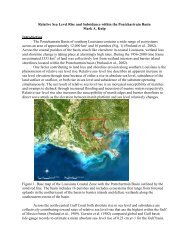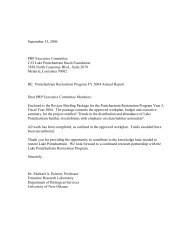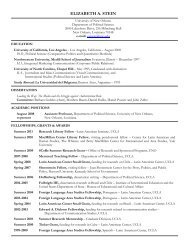Untitled - University of New Orleans
Untitled - University of New Orleans
Untitled - University of New Orleans
You also want an ePaper? Increase the reach of your titles
YUMPU automatically turns print PDFs into web optimized ePapers that Google loves.
time or full-time as a first-year student. All other students must<br />
pay a fee <strong>of</strong> $20 per course.<br />
A special invitation only, program is conducted during the spring <strong>of</strong><br />
each year in which prospective freshmen who meet certain minimum<br />
ACT score qualifications come to the campus and take Advanced<br />
Standing Examinations in one or more subjects. There is no fee for<br />
these exams, and credits earned will be entered on the student’s record<br />
after <strong>of</strong>ficial enrollment at UNO.<br />
CEEB Advanced Placement Examinations<br />
Advanced placement and credit will be granted in appropriate subjects<br />
to students who have taken the Advanced Placement Examinations<br />
<strong>of</strong> the College Entrance Examination Board. When the student<br />
has achieved a grade <strong>of</strong> four or five on the advanced placement examination,<br />
credit will be granted; when the grade is three, the decision<br />
regarding credit will be referred to the judgment <strong>of</strong> the individual<br />
department.<br />
Questions concerning the recording <strong>of</strong> these grades should be<br />
directed to the Office <strong>of</strong> Admissions.<br />
Other Advanced Credit<br />
Advanced credit may be awarded for certain subject examinations<br />
completed through the College Level Examination Program (CLEP) and<br />
for non-collegiate courses recommended for credit by the National<br />
Guide to Credit Recommendations for Non-Collegiate Courses. Credit<br />
so earned may or may not be applicable to the student’s degree program;<br />
final determination will be made by the student’s dean. Prospective<br />
students desiring detailed information on these programs are<br />
advised to write to the Office <strong>of</strong> Admissions requesting a brochure on<br />
advanced placement and credit.<br />
Advanced Placement Credit for Courses Bypassed<br />
<strong>New</strong> Freshmen<br />
In some departments, initial placement in sequential courses is<br />
based upon level <strong>of</strong> achievement from earlier training, as measured<br />
by scores on American College Testing program or departmental tests.<br />
Students who first entered the <strong>University</strong> after June 1967, and secured<br />
placement in this way above the normal beginning level, may petition<br />
for credit in the courses bypassed. No credit is allowed for remedial<br />
courses bypassed.<br />
Other UNO Students<br />
In some departments, students who do exceptionally well in a<br />
sequential course at a given level may be permitted by the department<br />
to enroll in a course in that sequence other than the next one. Students<br />
who received advanced placement in this manner after August 1976<br />
may petition for credit in the courses bypassed. No credit is allowed<br />
for remedial courses bypassed.<br />
Validation <strong>of</strong> Advanced Placement<br />
The validity <strong>of</strong> placement must be established by passing the next<br />
course in the sequence with a C or better grade (on the first attempt).<br />
Detailed information may be secured at the <strong>of</strong>fice <strong>of</strong> the college or<br />
division in which the student is enrolled.<br />
Credit Limitation<br />
Credit from all forms <strong>of</strong> advanced standing examinations (including<br />
those <strong>of</strong> the College Entrance Examination Board and the College<br />
Level Examination Program) and from bypass credit cannot exceed 30<br />
hours. This credit cannot be used to reduce the <strong>University</strong>’s minimum<br />
residence requirement.<br />
Credit for Correspondence and Extension Work<br />
Each college fixes the amount <strong>of</strong> degree credit it will accept in<br />
correspondence or extension courses <strong>of</strong>fered through the Continuing<br />
Education Division <strong>of</strong> Louisiana State <strong>University</strong> or through accredited<br />
extension divisions <strong>of</strong> other universities. In no case will a college<br />
accept more than 30 hours <strong>of</strong> work in this category and in all such<br />
work presented for degree credit the same requirements as to grades<br />
and quality points must be met.<br />
Credit for Armed Services Courses<br />
Many military educational programs are not directly usable in<br />
university degree programs because the focus is too narrow and pragmatic.<br />
On the other hand, some service schools provide instruction<br />
which may be equated with university work.<br />
When the student presents the Office <strong>of</strong> Admissions with an <strong>of</strong>ficial<br />
record <strong>of</strong> completion <strong>of</strong> a course at a service school, a notation<br />
will be made on the student’s evaluation sheet in accordance with<br />
the recommendation <strong>of</strong> the Guide to the Evaluation <strong>of</strong> Educational<br />
Experiences in the Armed Services prepared by the American Council<br />
on Education. Credit for such courses may or may not be applicable<br />
toward the student’s degree program; this will be determined by the<br />
student’s dean.<br />
Credit for ROTC or Health and Physical Education courses on the<br />
basis <strong>of</strong> service time will not be granted.<br />
USAFI General Educational Development (GED) first- and secondyear<br />
general tests will not be accepted.<br />
Credit for Experiential Learning<br />
The <strong>University</strong> does not evaluate experiential learning portfolios.<br />
However, for non-traditional educational programs, credit may be<br />
awarded on the basis <strong>of</strong> the successful completion <strong>of</strong> an appropriate<br />
advanced standing examination. Discretion for giving such an examination<br />
belongs to the individual academic department. In addition,<br />
formal education programs sponsored by non-collegiate organizations<br />
(business, industry, government, voluntary, and pr<strong>of</strong>essional agencies)<br />
may be awarded credit if recommended by the American Council on<br />
Education.<br />
Credit Limitation<br />
Combined credit from advanced standing examinations, bypassed<br />
credit, armed services credit, correspondence/extension, and American<br />
Council on Education recommended credit work can not exceed<br />
32 hours.<br />
Undergraduate Grading System<br />
A The grade <strong>of</strong> A has a value <strong>of</strong> four quality points per semester<br />
hour and is given for work <strong>of</strong> the highest degree <strong>of</strong> excellence.<br />
B The grade <strong>of</strong> B has a value <strong>of</strong> three quality points per semester<br />
hour and is given for work <strong>of</strong> a high degree <strong>of</strong> excellence.<br />
C The grade <strong>of</strong> C has a value <strong>of</strong> two quality points per semester<br />
hour and is given for satisfactory work.<br />
D The grade <strong>of</strong> D has a value <strong>of</strong> one quality point per semester hour<br />
and is given for passing but marginal work.<br />
F The grade <strong>of</strong> F does not earn quality points. This grade is given for<br />
work failed. A student who receives this grade in a course must<br />
repeat the course at UNO in order to receive credit for it.<br />
XF The grade <strong>of</strong> XF does not earn quality points and is treated<br />
the same as an F. The grade indicates failure as well as poor<br />
attendance.<br />
P The grade <strong>of</strong> P means passing and is assigned for satisfactory<br />
work taken by advanced standing examination, for satisfactory<br />
completion <strong>of</strong> certain noncredit courses or courses numbered<br />
below 1000, and for satisfactory completion <strong>of</strong> courses taken on a<br />
pass-fail basis. This grade does not carry quality points and is not<br />
used in computing the <strong>of</strong>ficial grade average <strong>of</strong> a student.<br />
<strong>University</strong> <strong>of</strong> <strong>New</strong> <strong>Orleans</strong>/50



